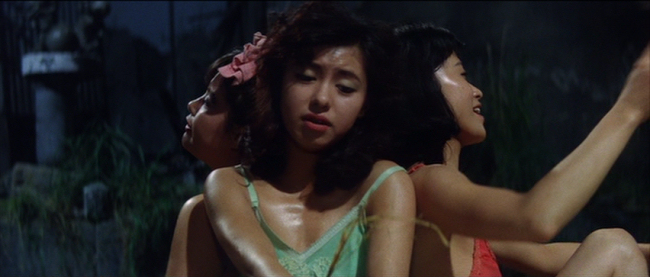
Somehow it's only to-day I heard about the death of Seijun Suzuki last week, on February 13. By coincidence, I had watched Suzuki's 1966 film Tokyo Drifter again over the preceding weekend. Tokyo Drifter is a film that compels me to compulsively rewatch it, largely because of its theme song, which I can almost hear coming out of the blu-ray sitting on my shelf. The song is repeated so many times in the film you get a little tired of it and yet it also draws you back in. The third or fourth time you watch the movie, you can't get enough of it.
It was almost three years ago I first wrote about the film, and my review begins with the sentence, "Does a man choose his song or does the song choose him?" Which gets to the existential question the film poses with this song, about a man who constantly sings it long before he has any desire for it to become a reflection of his identity. The protagonist is fiercely loyal to his yakuza boss and the last thing he thinks he wants is to be a lonely drifter. It's only the presence of the song that makes us question how much of it was his decision, maybe his unconscious decision.
This isn't an unusual question for a Suzuki film from the 1960s. Often about yakuza, the films pose questions of choice and identity within the story and stylistically, deliberately undermining realism in order to turn the genre film itself into a subject that strains against the confines of its definition. In one of Suzuki's most famous films, Branded to Kill, he seems to leave any sense of coherent plot as its hitman protagonist obsesses with rice cookers and falls in with a mysterious butterfly femme fatale.

But Suzuki didn't always make movies about yakuza. In one of his best, 1964's Gate of Flesh, he follows a group of prostitutes in the aftermath of World War II, dealing directly with issues relating to the U.S. occupation and the persistence of Japanese national pride after defeat that could for years only be obliquely alluded to. The themes of disillusioned self image and humiliation, though, can be found throughout Suzuki's work in the 60s as well is in most of the great Japanese films of the post World War II era.

I'm still relatively new to Suzuki's films and I count myself lucky I still have so many of them to see. Here you can find the reviews I've written of his films.
Twitter Sonnet #966
A scope of curls accords its prey a hair.
The forest changed to paper while she watched.
Upon the absent doe she fixed a stare.
Along her helm a storied tally notched.
There's blue inside the speeding, heated rock.
The pins that sink across the chart'll melt.
There's nothing left inside the sacred sock.
Perspective taught no braces with a belt.
In sandwich forests time was marked in salt.
Banal arrangements solved the growing road.
The strain will break a theatre with malt.
An ancient sugar keeps a seat in mode.
A saturated flower fades for steel.
A looping, spinning song becomes what's real.

No comments:
Post a Comment